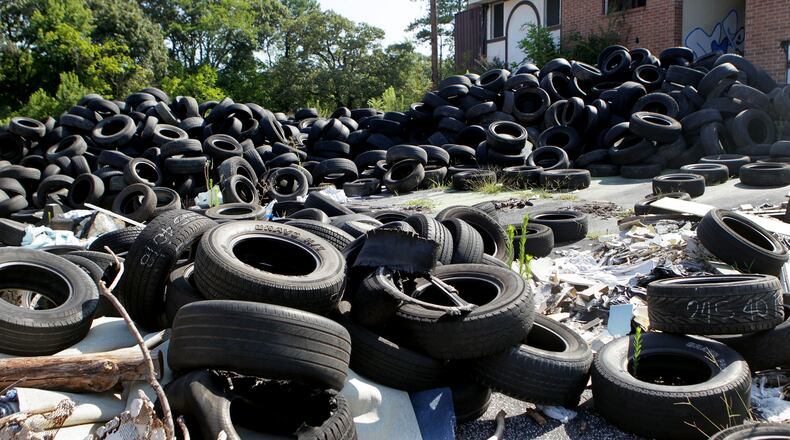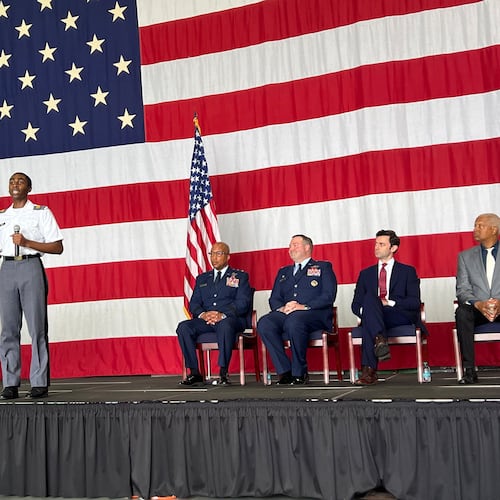Governors and lawmakers have been diverting millions of dollars in fee money meant for environmental cleanups for more than a decade, but now Georgia voters may help put a stop to that this fall.
The Senate on Monday unanimously gave final approval to a proposed “anti-bait-and-switch” constitutional amendment allowing lawmakers to dedicate fees collected when, for instance, you buy new tires, to the causes they promised the money would go to when they approved the levies.
"It is important that the Legislature establish itself as a powerful force in this government, and us passing dedicated (fees), time and time again seeing the governor take those fees, and in his budget recommendations, direct them somewhere else — it's not appropriate," said Senate Democratic Leader Steve Henson of Stone Mountain.
Hazardous waste and landfill cleanup trust funds have been raided since the early 2000s, and environmental activists, county government lobbyists and truth-in-taxation legislators have tried to stop the diversions for most of the past decade.
Environmental fund fees aren't the only ones that have been diverted. Money for years was also diverted from funds meant to pay for driver education and law enforcement training.
Under the state constitution, lawmakers can say fees or taxes will go to one thing and then spend it on another. The proposed amendment, which will be before voters in November, would make it so those fees could be directed to be spent only for their intended purpose.
Lawmakers created the Hazardous Waste and Solid Waste funds almost 30 years ago to clean up tire dumps, landfills and hazardous waste sites.
Currently, Georgians pay a $1 disposal fee on each replacement tire they buy and counties pay a solid waste disposal fee of 75 cents per ton.
Those fees were set to go down July 1, but the House Natural Resources Committee passed House Bill 926 last week, which would keep them at their current levels for the next five years.
The Association County Commissioners of Georgia said lawmakers have only appropriated all the fees collected for the trust funds once in the past 11 years, and that was for only one of the funds. Since 2009, about $150 million of the fee money has been diverted to the general fund, where it could fund other expenses, including schools, marketing programs, public health care and local projects.
Under state law, the General Assembly can’t formally dedicate fee money to specific causes without voters approving a constitutional amendment to do so. Once recessions hit in the early 2000s, governors and lawmakers began diverting the money away from environmental cleanup projects, using it instead to plug holes in the state budget.
So counties may not have received the money they needed to fix landfills or clean up tire dumps.
County lobbyists, environmental groups and others have long pushed lawmakers to put a constitutional amendment on the ballot allowing the General Assembly to dedicate fees to funds such as the Hazardous Waste Trust Fund. That way it would be harder for a governor or General Assembly to divert the money.
Under the measure setting up the vote in November — House Resolution 164 — the governor and General Assembly would still be able to divert the money if a fiscal emergency is declared during a severe recession. That was a key concession because governors and top lawmakers have wanted the ability to, say, use fee money to keep schools open if necessary during a recession.
The resolution was originally sponsored by longtime Rep. Jay Powell, R-Camilla, who died in the fall. He had long championed “anti-bait-and-switch” legislation.
FEES AND FUNDS
The state collects a scrap tire disposal fee when Georgians buy new tires for a Solid Waste Trust Fund and a landfill tipping fee for the Hazardous Waste Trust Fund. The General Assembly has diverted much of the money over the years to other programs. Below is a sampling of the fees collected and amount that went to the two environmental cleanup funds:
Fiscal 2009
$22 million collected
$1.97 million went to funds
Fiscal 2011
$20 million collected
$4 million went to funds
Fiscal 2013
$17 million collected
$5 million went to funds
Fiscal 2015
$20 million raised
$9.7 million to funds
Fiscal 2017
$22.8 million raised
$6.8 million to funds
Fiscal 2019
$23 million raised
$6.8 million to funds
SOURCE: Association County Commissioners of Georgia
About the Author
Keep Reading
The Latest
Featured



